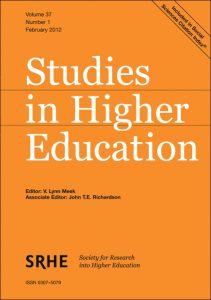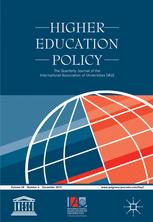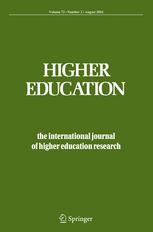 Kim, Y., Horta, H., & Jung, J. (2017). Higher education research in Hong Kong, Japan, China, and Malaysia: exploring research community cohesion and the integration of thematic approaches. Studies in Higher Education, 42(1), 149-168. doi: 10.1080/03075079.2015.1036850
Kim, Y., Horta, H., & Jung, J. (2017). Higher education research in Hong Kong, Japan, China, and Malaysia: exploring research community cohesion and the integration of thematic approaches. Studies in Higher Education, 42(1), 149-168. doi: 10.1080/03075079.2015.1036850
Hugo Horta, Jisun Jung (The University of Hong Kong) in collaboration with Yangson Kim from Seoul National University published an article mapping higher education research in four Asian countries. The article is to be published in the first issue of 2017 in Studies in Higher Education. The article analyzes higher education research published in international higher education journals by researchers from China, Hong Kong, Japan, and Malaysia from 1980 to 2013. It does so based on publication counts, and co-authorship and cross-citation mapping, examining these countries’ publication patterns in terms of thematic approach and community cohesion. The results show that each country has experienced distinct evolutions of higher education research, both in terms of the number of publications and thematic diversity. The research organization analyzed by co-authorship networks shows that higher education researchers in Hong Kong tend more to integrate two higher education research approaches – teaching and learning, and policy studies – into their research work. It is also in Hong Kong where most higher education researchers focus their research on both teaching and learning, and policy topics. Higher education researchers in China, Japan, and Malaysia are more thematically specialized in terms of both their positioning and their co-authorship preference. These findings suggest that a broader integration of different thematic areas may be linked more to path-dependent and contextual characteristics than to differences related to the development stage of higher education systems. This is confirmed by the cross-citation analysis, which shows that higher education researchers based in Hong Kong tend to cite each other more frequently than do those based in Japan, China, and Malaysia, suggesting a much greater community cohesion in Hong Kong than in these other countries. The findings highlight that while the maturity of a higher education system influences community cohesion, other factors influence thematic leaning and integration.
Free e-copies of the article can be found here (50 available): http://www.tandfonline.com/eprint/49a5cG2sMnqZn34HEsWf/full
 Xie. A (2016). Rural Students in China’s Elite Universities: Social Mobility and Habitus Transformation (in Chinese). Educational Research, 442(11), 74-81.
Xie. A (2016). Rural Students in China’s Elite Universities: Social Mobility and Habitus Transformation (in Chinese). Educational Research, 442(11), 74-81.
The Chinese version of affirmative actions towards of rural students has resulted more rural students in China’s most elite university. The study of their habitus transformation entering elite milieu is an important yet undeveloped area. Recent studies show that rural students are more likely to encounter a sense of inferiority when they navigate the university environment. The literature highlight the subordination of rural culture to urban one and pay little attention to the possibilities of habitus transformation of rural students. The fill the research gap, this study examines the social and culture experience of a group of rural students in four elite universities of China (985 project universities). The data is from an ongoing longitudinal study on a group of successful rural undergraduate students at four large, research-intensive, elite public universities. It will show how they start from a compartmentalized fitness between their habitus and the elite milieu they enter and how it can end with two different types of outcomes: “habitus transformation” and “habitus hysteresis”. Yet, having either of the outcomes, successful rural undergraduate students do not have to experience the “hidden injuries of the class”.
[Chinese Version] 在我国教育部门的有力推动下,重点高校的农村籍学生在数量上有了实质性的增长。针对正在高校中学习的处于社会流动过程中的学生的生存心态转变的研究,是一个重要却少有触及的领域。在为数不多的本土研究中,针对这一群体学生的研究较为关注的是他们的不适应和问题,农村籍大学生常被看作“较为自卑”的群体。这一研究思路强调了城乡文化与身份认同的对立关系,忽视了生存心态转变的可能性。对四所“985工程”高校/“985平台”高校的追踪调研分析表明,当农村籍学生进入精英高校的环境时,在学业方面,在他们既有的生存心态与新的机构环境之间存在着一定程度的匹配,这让学业的适应并不成为问题。他们所提的不适应主要来自于社会生活方面。旧有生存心态与新的机构生存心态的“连续性”和“断裂性”,让我们在分析那些较为成功的农村籍学生时,观察到两条基本的规律。“连续性”所带来的安全感和自信可以成为他们拓展新的领域,实现自身生存心态转变、逾越“断裂性”的重要机遇, “连续性”又似双刃利剑成为阻碍农村籍学生生存心态转变的重要阻力。
 Oleksiyenko, A. (2015). Reconciling tensions between excellence, access and equity in multilateral R&D partnerships: A Canadian collaborators’ perspective. Higher Education Policy, 28(2), 197-214.
Oleksiyenko, A. (2015). Reconciling tensions between excellence, access and equity in multilateral R&D partnerships: A Canadian collaborators’ perspective. Higher Education Policy, 28(2), 197-214.
Universities traverse epistemic, sectoral and geopolitical boundaries with increasing frequency, but along the way encounter challenges in mitigating unequal capacities, soaring costs and proprietary concerns. The bridging of disparate stakeholder interests requires an enormous effort, as research policies, institutional norms and organizational cultures in global science often remain irreconcilable. In seeking to identify strategic leverages for optimal balance in cross-border partnerships, this paper considers the case study of the Structural Genomics Consortium, which represents a synergy of resources, interests and commitments by research universities, governments and industries in Canada, Sweden and the UK. By triangulating data derived from content analysis of institutional materials, interviews and participant observations in Toronto, the study zeros in on the Canadian equilibration of symbolic, cultural and organizational forces aimed at securing long-term stakeholder support across institutional, sectoral and geopolitical domains.
 Postiglione, G. A. (2015). Research universities for national rejuvenation and global influence: China’s search for a balanced model. Higher Education, 70(2), 235-250.
Postiglione, G. A. (2015). Research universities for national rejuvenation and global influence: China’s search for a balanced model. Higher Education, 70(2), 235-250.
The search continues for a Chinese research university model that can balance quality and quantity in research and teaching. This paper argues that finding one depends upon deepening internationalization, defining educational sovereignty, and expanding university autonomy. The paper does this by examining selected aspects in the development of the research university systems of the Chinese mainland and China’s Hong Kong, particularly with respect to the governance of research and teaching.
